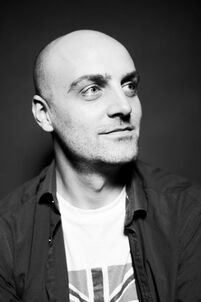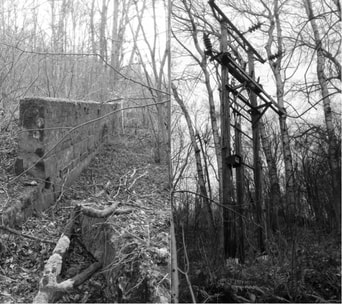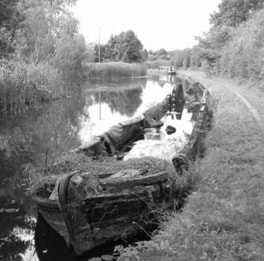Unlooked for Places
|
'Unlooked for Places’ takes its name from Liz Berry’s collection, Black Country, specifically a poem titled Trucker’s Mate. In this poem, and many within the collection, Berry investigates experiences and identities in the region with this lens of mystery and in-betweenness, often showcasing a sort of mucky, sexual, beastial aspect to the Black Country.
|
One of the significant markers of the Black Country environment is found in spaces that are in-between. Spaces where urban and rural mix, where industrial decay and the weeds of semi-rural space tangle for territory. There is a sense of pride and nostalgia for the area’s industrial heritage and working class ethics, as well as a sense of despair towards the ruins, waste grounds and new enterprises that now replace it. We’re not quite north and not quite south. We’re not quite the same as brummies. We’re not quite city and not quite countryside. We can’t even decide where the Black Country begins and ends. I think cultures stemming from this sort of unmappable, in-betweenness, imbibe a sense of the borderless, the ghostly, the uncanny.
|
Much work has been done in the field of environmental psychology in terms of how the formation of identity is linked to sense of place. It is, in some ways, a Freudian model, without the focus on the bodily. Their argument suggests that one’s identity is formed, in part, through a series of drives and acts that either attach or distance the subject from their environment – essentially creating a sense of place. They argue that:
people use place identifications in order to distinguish themselves from others. In this sense place functions in a similar way to a social category and therefore place identifications can be thought of as comparable to social identifications.
The Environmental Psychologists suggest that our sense of place, be it attachment or detachment, is based around a system of symbols that organise the cultural identity and demographic of place; what Harold Proshansky called Place-Identity. Notions of self are inextricably connected to our sense of community and place, which in turn, is built up from a series of attaching and distancing acts that the subject plays with alongside history, heritage, landscape, family etc. As such, the perceptions we have of ourselves are harnessed by our relationships with our place, space, community - and all their multiple contradictions.
people use place identifications in order to distinguish themselves from others. In this sense place functions in a similar way to a social category and therefore place identifications can be thought of as comparable to social identifications.
The Environmental Psychologists suggest that our sense of place, be it attachment or detachment, is based around a system of symbols that organise the cultural identity and demographic of place; what Harold Proshansky called Place-Identity. Notions of self are inextricably connected to our sense of community and place, which in turn, is built up from a series of attaching and distancing acts that the subject plays with alongside history, heritage, landscape, family etc. As such, the perceptions we have of ourselves are harnessed by our relationships with our place, space, community - and all their multiple contradictions.
What then, if yo’m from the Black Country - where we don’t really have a map of where it starts and ends, where our industrial heritage is quite far removed from our modern life, where strange patches of rural space cosy up to rusted forges, where Merry Hill Shopping Centre, built on the remains of Roundoak Steelworks, shares the same patch of land as Lodge Hill Estate and Saltwells Nature Reserve. What does this do to a sense of self and a sense of place then? Because we have this constant reminder of what Black Country means, but also no concrete idea of where it is or what it might be in the future, we’re subject more and more to these feelings of borderlessness.
An interesting way to play with this is through psychogeography. Guy Debord defined psychogeography as, “The study of the specific effects of the geographical environment, consciously organised or not, on the emotional behaviour of individuals.” It focusses on Urban Wandering, “the imaginative reworking of the city, the otherworldly sense of spirit of place, the unexpected insights and juxtapositions created by aimless drifting, the new ways of experiencing familiar surroundings”.
So, the psychogeographer no longer walks to work and says this is the library - a place for books, this is the lecture hall - a place for teaching. The psychogeographer drifts and allows a re-imagining of space and the structures of power that are at play within those spaces.
In his Pocket Essentials to Psychogeography, Merlin Coverley argues, “The city must be rebuilt upon new principles that replace our mundane and sterile experiences”, and that the way this can be done is through this Urban Wandering, essentially becoming, one who “remakes the city in accordance with his own imagination […] that seeks to overthrow the established order of the day”. We could see this as taking a pick and mix approach to looking into one’s sense of place, space and history, drawing conclusions on how it affects the community and / or how it might be challenged.
So, the psychogeographer no longer walks to work and says this is the library - a place for books, this is the lecture hall - a place for teaching. The psychogeographer drifts and allows a re-imagining of space and the structures of power that are at play within those spaces.
In his Pocket Essentials to Psychogeography, Merlin Coverley argues, “The city must be rebuilt upon new principles that replace our mundane and sterile experiences”, and that the way this can be done is through this Urban Wandering, essentially becoming, one who “remakes the city in accordance with his own imagination […] that seeks to overthrow the established order of the day”. We could see this as taking a pick and mix approach to looking into one’s sense of place, space and history, drawing conclusions on how it affects the community and / or how it might be challenged.
|
In terms of my own argument here, I'm suggesting several things:
|
I focus on this in my upcoming Wild Pressed novella, Bella. The region becomes a symbolically charged space for my narrative - dealing with the conflict we have here between loss and progress, between community and estrangement, past and present, wild and domestic, dead and alive.


